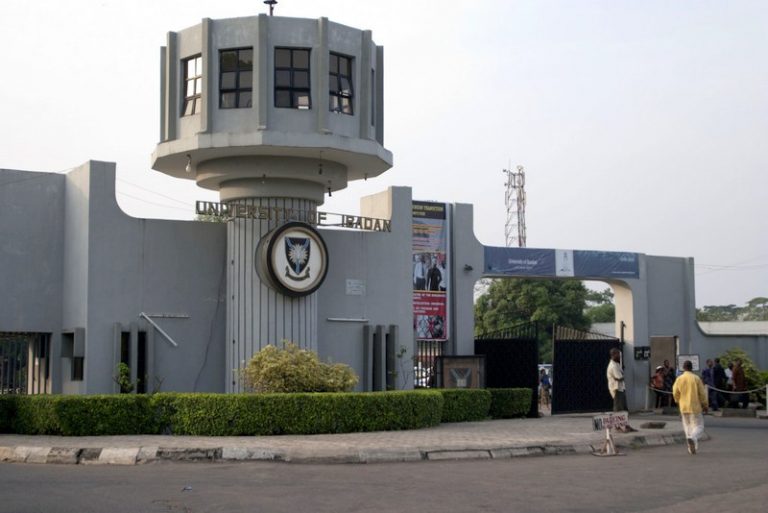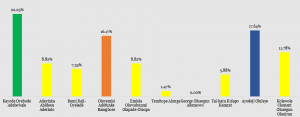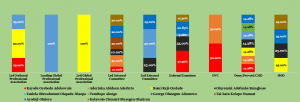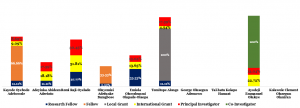
There is no doubt there have been counter and alternative arguments on who becomes the 13th Vice Chancellor of the University of Ibadan as the tenure of Professor Abel Idowu Olayinka ends this year. From the primary to the secondary stakeholders in the University Community and the city that hosts the institution, everyone wants his or her candidate to emerge as the new Vice Chancellor.
As the arguments rage on, our analyst examines leadership and research prowess of some contenders [in the context of grants won and participation in the researches supported by the grants]. For the analysis, several factors were considered in the measurement of the current and previous leadership positions of the contender, and grants they won locally and internationally. Within the grants, their participation as principal or co-investigators were also considered. Suffice to note that our interest in analysing their leadership positions and grants, including participation was inspired by a report which stated that Professor Abel Idowu Olayinka, the current Vice Chancellor, emerged due to his world class recognition and rich administrative experience.
Our Measures and Data
Register for Tekedia Mini-MBA edition 19 (Feb 9 – May 2, 2026): big discounts for early bird.
Tekedia AI in Business Masterclass opens registrations.
Join Tekedia Capital Syndicate and co-invest in great global startups.
Register for Tekedia AI Lab: From Technical Design to Deployment (next edition begins Jan 24 2026).
Apart from leveraging the report, we also considered some of the insights from the previous piece, which establishes the need for strong strategic leadership in the University. In our quest of understanding both the leadership and, grant attraction and participation, we formed two metrics. The first metrics entails some indices that measures current and previous leadership positions of the contenders. The second metrics encompasses indices that the categories of grants won by the contenders and their level of participation.
Current and Previous Leadership Metrics
- Led National Professional Association: Previously being President or Chair of national professional association(s)
- Leading National Professional Association: Currently heading national professional association(s) as President or Chair
- Led Global Professional Association: Previously being President or Chair of global professional association(s)
- Leading Global Professional Association: Currently heading global professional association(s) as President or Chair
- Led Internal Committee: Previously headed committee(s) in the University. This also represents being Hall Warden, Director of Units among other positions that were not related to being Head of Department.
- Leading Internal Committee: Currently heading committee(s) in the University. This also represents being Hall Warden, Director of Units among other positions that were not related to being Head of Department.
- Internal Examiner: This indicates contender who is examining postgraduate students, especially PhD candidates in the University.
- External Examiner: This indicates contender who is examining postgraduate students, especially PhD candidates outside the University [in Nigeria and outside the country]
- Deputy Vice Chancellor: Currently being Deputy Vice Chancellor or held the position previously.
- Dean/Provost/Chief Medical Director: Currently being Dean of Faculty, Postgraduate School or others or Chief Medical Director or held the position(s) previously.
- Head of Department: Currently heading a department or previously held the position.
Grants and Participation Metrics (GPM)
- Research Fellow: Currently participating or previously participated as a Research Scholar in a University/an Institute in Nigeria or outside the country
- Fellow: Honorary fellowship given by professional association(s)
- Local Grant: Grant(s) won by a contender within country [these include the University Senate Research Grant, TEFUND among others]
- International Grant: Grant(s) won by a contender outside the country [these include grants from international organisations such as UNICEF, WHO, UN among others]
- Principal Investigator: Led the research team after winning either local or international grant(s). When a contender is(was) a research fellow we coded his or her participation as being a principal investigator.
- Co-Investigator: Being second investigator to the principal investigator after winning either local or international grant(s). This also includes being a member of the research team.
To understand these indices empirically, we sourced data from the profiles and resumes of the contenders which are available on the University’s website and other personal sources of the contenders [available on the Internet]. We believed that as at the time of collecting the data, available data are what the contenders want to be available to the public. Therefore, our analysis does not cater for any information uploaded after August 7, 2020. This is premised on the fact that the contenders are monitored from the first day of announcing the position [VC seat] in the University. With this, it is expected of the contenders to know that their strategic information, capable of increasing their chances should be available to the public, considering public views and expectations about who emerges.
In the previous analysis, we focused on Professor Oyebode Adebowale of the Department of Chemistry, Faculty of Science; Professor Remi Raji-Oyelade of the Department of English, Faculty of Arts; Professor Adeyinka Abideen Aderinto of the Department of Sociology; Professor Oluyemisi Adefunke Bamgbose, SAN of the Department of Law, Faculty of Law; Professor Emiola Oluwabunmi Olapade-Olaopa of the College of Medicine; Professor Temitope Alonge of the University College Hospital (UCH) and Professor George Olusegun Ademowo of the Department of Pharmacology and Therapeutic, Faculty of Basic Medical Science.
In the current analysis, we expand the contenders with the addition of Professor Ayodeji Oluleye, Department of Industrial and Production Engineering, Faculty of Engineering; Professor Tal-hatu Kolapo Hamzat, a Professor of Neurological Physiotherapy, and Professor Kolawole Clement Olusegun Olaniran, Department of Teacher Education. These new entrants made it to the samples after analysis shows that they are also being seen as potential 13th Vice Chancellors of the University.
In the course of generating the needed data for the analysis, as stated earlier, getting data about some of the contenders was difficult despite deploying varied digital data collection tools. For instance, existing sources used for generation of data on Professor Kolawole C.O.O. and Professor Temitope O. Alonge including Professor Oluyemisi Adefunke Bamgbose were not detailed enough.
Beyond having interest in revealing the leadership and research ability in terms of grant(s) and participation in researches, sourced data on when each of the contenders became professor. This is imperative considering the fact that being a professor in the last 10 years is one of the factors for submitting application for the position. In this regard, we only found that Professors Adeyinka Abideen Aderinto and Tal-hatu Kolapo Hamzat became Professors in 2012 [effective from October 1, 2009], while Professor Kolawole C.O.O became Professor in 2012 [effective from October 1, 2008].
Emerging Insights
Exhibit 1: Individual Status on Current and Previous Leadership Metrics

Exhibit 2: Individual Status on the Leadership Metrics

Exhibit 3: Place in Grants and Participation Metrics

Possible Grants and Projectile of Attracting Funds
In terms of leadership positions, Professors Kolawole Oyebode Adebowale, Ayodeji Emmanuel Oluleye, Oluyemisi Adefunke Bamgbose, Kolawole Clement Olusegun Olaniran stood out. In the area of grants, Professor Remi-Raji Oyelade led other contenders. Professor Ayodeji Emmanuel Oluleye and Professor Adeyinka Abideen Aderinto followed him.
Analysis indicates that in terms of being Research Fellow, Professor Emiola Oluwabunmi Olapade-Olaopa and Professor Remi-Raji Oyelade held sway. They are followed by Professors Kayode Oyebode Adebowale, Adeyinka Abideen Aderinto and Temitope Alonge. Looking at the data, it emerges that Professor Remi-Raji Oyelade, Professor Adeyinka Abideen Aderinto and Professor Temitope Alonge have led research teams that exhausted the grants they won than other contenders. Professors George Olusegun Ademowo and Tal-hatu Kolapo Hamzat and Kolawole Clement Olusegun Olaniran were not captured in the Grants and Participation Metrics [see previous notes on data sources].
In monetary value, the total amount of the grants won by a majority of the contenders are not in the public domain. Efforts on getting the amount from the University’s website or annual report of the institution proved abortive as there are no indications to their accessibility on the website. However, examination of Professor Ayodeji Oluleye’s profile and resume reveals that his individual and collective grants generated $100,000 in 2001; £4,000 in 2009; $7,449,000 in 2009; and $500,000.
From the leadership positions to grants winning and participation in researches, it is obvious that the contenders are differed. Therefore, any candidate with superior leadership, capability and ability to innovate and align with current thinking in the global management of university would be better for the University.




Amazing efforts Mutiu. Really amazing to put these numbers together for the community.
I join others to commend the efforts of the researchers in putting together this write-up.
However, I have some reservations regarding one or two of the indices used in the report. For instance, it might not be so apt to consider some appointments in coming to some conclusion; you do not apply to become Deputy Vice Chancellor, no, rather if you are ‘favoured’, you are nominated to contest for the position. No matter how much you contribute, as a student or a benefactor, to the development of a/your hall of residence, you can attain the position of Hall Warden or Hall Master only by appointment/nomination. In light of this, one’s desire to such positions could remain a dream if the nomination never comes.
I strongly support due consideration for:
leadership positions to which it is the prerogative of the individual to apply, which is indicative of his/her desire! or leadership positions, especially of academic inclination, where the scholarship strengths of the individual is the basis for his/her appointment by his/her peers
grants attracted by the individual; especially, since his/her attainment of the full professor status. After all, one can only qualify to apply to the position not less than ten (10) years of being a professor.
assurance of the candidate to implement the University’s Strategic Plan – the candidate’s plans must highlight this.
Just aspects of my thoughts to the success of a system which paid the bills for my training and from where I am also now getting paid for the survival of my own family.
In all, I commend your thoughtfulness in coming out with the write up which has also given us an opportunity to air our personal views on the subject.
Thanks for expressing your views. The idea of including Hall Warden and Deputy Vice Chancellor positions is based on the fact occupant must have developed certain level of managing human and material resources. Nevertheless, your points have been noted. They would be considered for improvement on the metrics.
The author will respond. Cheers.
We see how it goes.
We need to be researching our politicians this way, so that some of them can be disqualified before the first primary ballot is cast. It is not enough to argue who didn’t finish primary school or who dodged national service. By the time you overwhelme some of them with multitude of facts working against their candidature, just putting out the fire is enough to drain their political capital.
Nice job Mutiu.
Apt. We should have such analysis on our public office holder.
*holders.
We can only hope that those who will eventually cast their votes in favor of any of the candidates would put the metrics into consideration.
What an amazing job, if we can do this in our selection process for politicians and kings we will always have the best men and women who can deliver
Excellent! Keep it up!
It’s interesting to see that efforts are being made to provide the public empirically driven information that will enable people see things through the lens of unorthodox approach.
I sincerely appreciated the efforts put together to give us insight analysis and data of the contending candidate for the exalted VC office. Nice one Sir. I supported others move to apply such format for political office holders and public servants
Love this
This is an excellent piece. It is empirically driven and objective. Keep it up, Mutiu.
Excellent analysis
You don’t have the Profile of these people, you are just projecting some candidates ahead.One of them you assessed as 0% on scale surpass others in term of funds he has attracted to UI.
I think they were sincere enough to let the reader know that information about the amount of research grant’s won by each individual was not available on the net. How are they expected to know if those concerned failed to upload those pieces of information?
This is an excellent job. Given the right to vote, I have made a choice from this analysis. I am proud to be a UIte.
Similar metrics should also be adopted to appraise the performance of every Nigerian political office holder while getting them informed that their track records are being objectively evaluated and publicized. If we don’t get it better in our country, who will?
A very good perspective of looking at it even though the Research never made any categorical statement about who’s the ideal man to man the seat of the VC. Mayne they’re all equally qualified then! Or do we take it that the Researcher is aware that other extraneous indices do come into play in choosing the VC? By the way, Prof Temitope Alonge is the first Professor of Orthopedic and Trauma in the Department of Surgery, University of Ibadan. This is aside that he served as the Chief Medical Director of UCH, 2011-2019. Let it be on record too that Prof Oluyemisi Bangbose (SAN) the only female in the race has since pulled out of the race.
Thank you for the comment. We all know that in research no researcher covers all variables. This has been the single reason researches do have limitations. On the CMD you mentioned, I believe our notes on data sources have captured that.
In the real sense, most of these metrics may not amount to a successful leadership.
As beautiful as the metrics may sound in the selection process, it takes more than being a prolific researcher for a good administration. There is need for a combination of all these, with administrative ability towering highest, to make a good Vice Chancellor.
I’m not fronting for any candidate, though.
Thank you for the observation. Metrics are there to help the public gauge the competence level of the contenders. Of course, metrics are not the same with action. This has been addressed in one of the previous articles about the selection. Also, we will be releasing a new article that explicates link between planning and reality. Thank you.
This analysis places the candidates on a scale that allows the town into some of the intricacies of the university system. Within the university, a scoring template for the assessment of the candidates would further generate a shorter list. I pray that the best candidate for our great UI emerges as the next Vice Chancellor. I have faith that this shall happen without fear or favour.
The analysis provided is a right step in the right direction for the future of the great UI. Howbeit, the analysis provided on the current contestants greatly shows a SERIOUS dearth of information on some of the contenders. A more laudable approach in the future might be to check their records starting from home.I.e.their Department to Faculty to College to the University and finally Global recognition and grant attraction prowess. You will only be greatly shocked that some of those who had scored the least in your assessment (statistics) may actually have score the highest points. This is a food for thought on a more worthwhile approach to this kind of assessment in the future. Cheers.
Great effort made but one vital variable that cannot be captured and the community must consider very seriously is character.